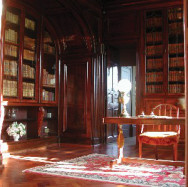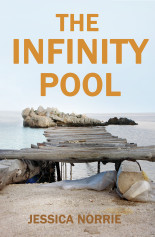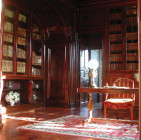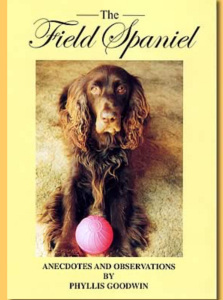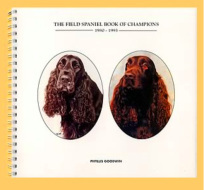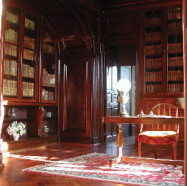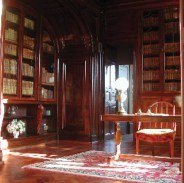Pam Lecky's Blog, page 37
March 3, 2016
A Conversation with Author Jessica Norrie
Today in the Library we have Jessica Norrie, who has dropped in to say hello and to share some insights into her life as an author.
You are very welcome, Jessica, please introduce yourself:
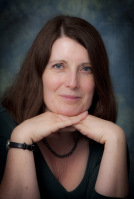 I studied French at Sussex University and then trained as a teacher and translator. I still do a bit of both, though I’m hoping to leave schools behind me soon after many years at the chalkface. I live in NE London with my two grown up children, one a translation trainee, the other a teaching assistant (so I must have done something right). I’ve published textbooks and teaching resources, and written a few short stories and thoughts, but “The Infinity Pool” is my first completed novel.
I studied French at Sussex University and then trained as a teacher and translator. I still do a bit of both, though I’m hoping to leave schools behind me soon after many years at the chalkface. I live in NE London with my two grown up children, one a translation trainee, the other a teaching assistant (so I must have done something right). I’ve published textbooks and teaching resources, and written a few short stories and thoughts, but “The Infinity Pool” is my first completed novel.
Did you read much as a child? Are you an avid reader now? Do you prefer books in your own genre or are you happy to explore others?
I read everything as a child. Couldn’t be prised from the back of the cereal packet at breakfast and read under the covers at night. It helped hugely that my father ran a large bookshop in London, we were members of children’s book clubs (anyone remember the Puffin Club?), and, with no internet or even videos, we had lots of time to read. I still read a lot now, although I’m more critical – I often get a sense of déjà vu. I seem harder to please nowadays! I like fiction, travel writing and the occasional biography or historical account.
Are you self-published or traditionally published?
To my disappointment, self published, although via an agent’s programme which seems to be more favourable in terms of royalties and which has an unexpectedly personal service from Amazon. After 18 very constructive and polite rejections, my agent and I just decided to get on with it! I was asked by Amazon if they could have an exclusive on the ebook for a year, but from July 16 rights will be available again.
Which genre do you write in and why?
Literary fiction. I tried crime, but I’m just not bloodthirsty enough. I hugely admire the plotting skills of thriller writers, but personally I’m more interested in characters and themes, and a really complicated plot would have got in my way. If you add a lifetime of reading to a lifetime of marking, you get a pretty fastidious user of language, so the prose quality matters as much as the action to me – although of course you have to keep the reader turning the pages or it’s all pointless.
Who has been the biggest influence on your writing?
I like the sardonic wit and sadness of Katherine Mansfield and Dorothy Parker. More recent writers I admire are AL Kennedy, John Boyne (for “A History of Loneliness”), Kate Atkinson and Deborah Moggach, also Linda Grant. Ian McKewan, Julian Barnes. I thought “The Sense of an Ending” was a wonderful book.
Has your country of origin/culture influenced your writing?
Well, I’m British and I write in English. But my degree was French Literature in the wonderful school of European Studies at Sussex, so I’ve read a lot of French, Spanish, German, Italian, and Russian fiction too. I like the clean, spare quality of French prose. I’ve always lived and worked in multi cultural cities and I can’t imagine writing something that didn’t refer to a spread of cultures with all the sympathies and tensions that arise between them. The more the world gets embroiled in conflict, the more important that seems.
What part of the writing process do you find most difficult? How do you overcome it?
I can be a bit long winded. My sentences go on and on, and I paraphrase and get bogged down. And I often need help with working out a plot, in the early stages.
Do you have a favourite time of day to write?
Morning, in theory, or whenever an idea comes.
What is the best thing about being an author? And the flipside – what is the worst?
It’s wonderful because you can escape to the world you’re creating. For “The Infinity Pool”, it was a beautiful Mediterranean island in summer, so I was effectively on holiday when I was writing it. And I loved seeing the good reviews and realising people see things in my story that I didn’t even know were there, or when they refer to tiny details so you know they’ve read it thoroughly and it was worth being so specific. Getting stuck is discouraging, having down days when you think your writing isn’t any good – and aching backs/fingers/wrists from too long at the computer. And thoughtless one star reviews that just say “boring” – I wish Amazon had some quality control over reviews.
Is social media an essential chore or something you enjoy? Which forum do you prefer?
Facebook is quite fun. I’ve certainly “met” some fantastic people and sold more books through FB than I would have without it, but it’s easy to get addicted and waste hours. I find Twitter very annoying, but I’m told that’s because I don’t use it properly. I do tweet, but I’ve no idea whether it’s sold any books for me or not. And the blogs vary – some are very funny, informative and helpful. Like people really!
If you weren’t an author, what would you be up to?
Teaching, translating… No. I’d be a famous soprano opera singer or a pianist who could move everyone to tears.
It’s the last day and the earth is facing oblivion – what book would you read?
Anything by Laura Ingalls Wilder! She’s so constructive, determined and beautifully written. I think it might be hard to concentrate on anything denser than that.
Please tell us about your latest published work.
I’ve been asked by a few people for a sequel to “The Infinity Pool”, so I’ve decided to continue the story of Maria, the young local girl who got so enmeshed with the strange foreign visitors to her island. But she’s grown up a bit now, and is still just as spirited. She’ll need to be, as I’m giving her some tough demands. We’re not in paradise now!
If you would like to know more about Jessica or her work, please click on the links below:
Links to book including an audiobook version (French and German translations on the way):


February 29, 2016
My Writing Heroes: Maria Edgeworth (1767-1849)
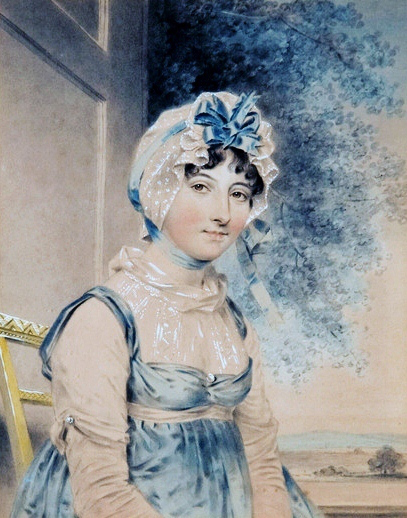
“Thady begins his memoirs of the Rackrent Family by dating MONDAY MORNING, because no great undertaking can be auspiciously commenced in Ireland on any morning but MONDAY MORNING. ‘Oh, please God we live till Monday morning, we’ll set the slater to mend the roof of the house. On Monday morning we’ll fall to, and cut the turf. On Monday morning we’ll see and begin mowing. On Monday morning, please your honour, we’ll begin and dig the potatoes,’ etc.
All the intermediate days, between the making of such speeches and the ensuing Monday, are wasted: and when Monday morning comes, it is ten to one that the business is deferred to THE NEXT Monday morning. The Editor knew a gentleman, who, to counteract this prejudice, made his workmen and labourers begin all new pieces of work upon a Saturday.”
One of my writing heroes, Maria Edgeworth was an Anglo-Irish author who was friends with Jane Austen and Sir Walter Scott, was wooed by a Swedish Count and was friends with the wife of the Duke of Wellington. Her love of Ireland, and in particular the family estate in Longford, coloured her writing and gave it a unique flavour.
Her Life:
Maria was born in Oxfordshire on the 1st January 1767, the second child of Richard Lovell Edgeworth (who eventually fathered 22 children by four wives). Her mother, Anna Maria Elers, passed away when she was five and she continued her schooling in England up to age 14. When her father married his second wife, Honora Sneyd, in 1773, she went with him to his estate, Edgeworthstown, in Co. Longford, Ireland. She took charge of her many younger siblings and was home-tutored in law, Irish economics and politics, science, and literature by her father. Honora, her step-mother and friend (there was only a few years between them), died in 1775 and her father married his sister-in-law, Elizabeth, which would have been considered shocking at the time.
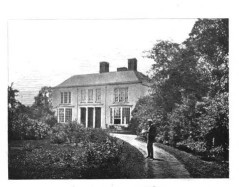 Maria became her father’s assistant in managing the Edgeworthstown estate. She observed and recorded the details of daily Irish life, later drawing on this experience for her novels. Both Maria and her father were in favour of Catholic Emancipation, agricultural reform and increased educational opportunities for women. She particularly worked hard to improve the living standards of the poor in Edgeworthstown. In trying to improve conditions in the village she provided schools for the local children of all denominations.
Maria became her father’s assistant in managing the Edgeworthstown estate. She observed and recorded the details of daily Irish life, later drawing on this experience for her novels. Both Maria and her father were in favour of Catholic Emancipation, agricultural reform and increased educational opportunities for women. She particularly worked hard to improve the living standards of the poor in Edgeworthstown. In trying to improve conditions in the village she provided schools for the local children of all denominations.
In 1798, General Humbert landed in Kilalla, Co. Mayo, took Castlebar and marched for the Midlands. Maria and her father went to Longford town with a corps of infantry to help to defend it against the French. After the news of the French defeat at Ballinamuck, the jubilant mob turned on Edgeworth for suspected rebel sympathies and stoned him. After visiting the battlefield, Maria and her father returned to Edgeworthstown to find windows in the house smashed but no other damage done.
She travelled to England and Europe with her parents on many occasions. They met all the notables, and Maria received a marriage proposal from a Swedish courtier, Count Edelcrantz, which she refused as he would not come to live in Ireland and she would not leave it. She never married. On a visit to London in 1813, Maria met Lord Byron whom she did not like. She entered into a long correspondence with Sir Walter Scott after the publication of Waverley in 1814, in which he gratefully acknowledged her influence, and they formed a lasting friendship. She visited him in Scotland at Abbotsford House in 1823, and the following year, he visited Edgeworthstown.
After her father’s death on 13th June 1817 Maria travelled to London, Paris and Geneva before returning again to Edgeworthstown in 1821. By this time her European reputation as a writer was secure, she was warmly received in literary and social circles and had many great admirers of her work including Jane Austen, with whom she had a somewhat unusual friendship.
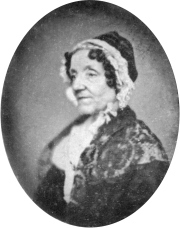 Maria was in her eighties when she witnessed the worst of the famine in Ireland. She was untiring in her attempts to help the distressed tenants she saw all around her and even influenced admirers in Boston to send food for the poor and starving Irish tenants. This gained her much respect and love within her locality. Unfortunately, she was not destined to see Ireland restored to the relative tranquillity of the post-famine era. The deaths of both her brother Francis in 1846, and sister Fanny in 1848, along with bouts of illness tried her severely. She died on 22nd May 1849 and was buried alongside her father in the family vault in the Churchyard of St. Johns in Edgeworthstown, where Isola Wilde, sister of Oscar Wilde, is also buried.
Maria was in her eighties when she witnessed the worst of the famine in Ireland. She was untiring in her attempts to help the distressed tenants she saw all around her and even influenced admirers in Boston to send food for the poor and starving Irish tenants. This gained her much respect and love within her locality. Unfortunately, she was not destined to see Ireland restored to the relative tranquillity of the post-famine era. The deaths of both her brother Francis in 1846, and sister Fanny in 1848, along with bouts of illness tried her severely. She died on 22nd May 1849 and was buried alongside her father in the family vault in the Churchyard of St. Johns in Edgeworthstown, where Isola Wilde, sister of Oscar Wilde, is also buried.
Her Work:
Her first literary output came in 1795 with the publishing of Letters to Literary Ladies, which was a feminist essay pleading for the reform of women’s education. Much of her earlier work was in collaboration with and heavily edited by her father, and had a didactic style as a result. But in 1800, her masterpiece Castle Rackrent, was anonymously submitted without her father’s knowledge and published by the London bookseller and publisher Johnson. It was not until it was in its third edition that she had the courage to put her name as author to the book. The novel portrays the Irish people and the social conditions which they endured at the time, in a very realistic and at the same time unhostile manner. The Irish author Padriac Colum remarked: “One can read it in an hour. Then one knows why the whole force of England could not break the Irish people.”
Her fictional but realistic characters, and the manner in which she portrayed a dignified peasantry and way of country life, was new in the literature of fiction. Where she led many were later to follow. It is mainly on this point that the literary reputation of Maria Edgeworth rests.
Although in her lifetime she would have witnessed the American revolution, the French revolution, the rise and fall of Napoleon and the suppressed revolts of 1798 and 1848, it is her memories of the famine years, and the abuse of the Irish peasants under cruel Landlords that had most effect on her and these issues that surface most in her work.
Her novels, Belinda, Helen and The Absentee, are firm favourites worldwide and in no small way contributed to her reputation and earned her the respect of both fellow authors and critics.
Partial list of published work:
Letters for Literary Ladies– 1795 ; Second Edition 1798
An essay on the Noble Science of Self-Justification – 1795
The Parent’s Assistant – 1796
Practical Education – 1798 (2 vols; collaborated with her father, Richard Lovell Edgeworth and step-mother, Honora Sneyd)
Castle Rackrent (1800) (novel)
Early Lessons– 1801
Moral Tales- 1801
Belinda – (1801) (novel)
The Mental Thermometer- 1801
Essay on Irish Bulls– 1802 (political, collaborated with her father)
Popular Tales– 1804
The Modern Griselda – 1804
Moral Tales for Young People– 1805 (6 vols)
Leonora – 1806
Essays in Professional Education- 1809
Tales of Fashionable Life– 1809 (first in a series, includes The Absentee)
Ennui – 1809 (novel)
The Absentee – 1812 (novel)
Patronage – 1814 (novel)
Harrington – 1817 (novel)
Ormond – 1817 (novel)
Comic Dramas– 1817
Memoirs of Richard Lovell Edgeworth– 1820 (edited her father’s memoirs)
Rosamond: A Sequel to Early Lessons- 1821
Frank: A Sequel to Frank in Early Lessons- 1822
Tomorrow– 1823 (novel)
Helen – 1834 (novel)
Orlandino- 1848 (temperance novel)


February 28, 2016
A Conversation with Author Wendy Lou Jones
Today in the Library we have Wendy Lou Jones , who has dropped in to say hello and to share some insights into her life as an author.
You are very welcome, Wendy Lou, please introduce yourself:
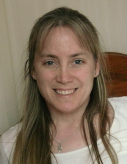 I was brought up on the south coast of England, trained to be a doctor in Birmingham and settled in Herefordshire, where I now live with my husband and 2 boys.
I was brought up on the south coast of England, trained to be a doctor in Birmingham and settled in Herefordshire, where I now live with my husband and 2 boys.
Did you read much as a child? Are you an avid reader now? Do you prefer books in your own genre or are you happy to explore others?
I read very little growing up and only really took to it in earnest with the advent of the e-reader. I read historical romance, contemporary romance and some women’s fiction. Not very adventurous, I know, but that’s just what I like.
Are you self-published or traditionally published?
I self-published in the start, but have my first 3 novels published under an imprint of HarperCollins now.
Which genre do you write in and why?
I write contemporary romance, mainly because I’m rubbish at history!
Who has been the biggest influence on your writing?
I think Lisa Kleypas was the one who got me into reading big time, so it’s probably her I have to thank in part for the transition from reader to writer.
Has your country of origin/culture influenced your writing?
I do mainly write settings from my life, so I guess, yes, it has.
What part of the writing process do you find most difficult? How do you overcome it?
Coming up with the new idea for a novel I find stressful. Once I’ve got something, I can play around with it to my heart’s content. I tend to write a book ahead of what people want, so I’m never under pressure to produce. There’s always a story waiting.
Do you have a favourite time of day to write?
I would prefer first thing, but unfortunately that time is filled with kid chores, so night time is my most productive time of day.
What is the best thing about being an author? And the flipside – what is the worst?
The best is connecting with someone. Finding out that someone actually got your writing, that’s the best. The worst? The insecurity of the job. You’re only as good as your last book and the next one might be pants!
Is social media an essential chore or something you enjoy? Which forum do you prefer?
I’m a Facebook girl at heart. I’ve got into twitter, but the pace and potential to miss so much doesn’t work for me.
If you weren’t an author, what would you be up to?
My previous goal was to be a forensic pathologist and without marriage, kids and writing, that would be what I’d do.
It’s the last day and the earth is facing oblivion – what book would you read?
None. I’m too slow. That’s the time to live your own life, not someone else’s.
Please tell us what you are working on or your latest published work.
 My last book published was The Summer We Loved. It’s a love story set around a hospital and centred on a nurse and an anaesthetist. It’s medical, Jim, but not as you’d know it!
My last book published was The Summer We Loved. It’s a love story set around a hospital and centred on a nurse and an anaesthetist. It’s medical, Jim, but not as you’d know it!
If you would like to know more about Wendy Lou please click on the links below:
www.facebook.com/escapeintolove


A Conversation with Author, Wendy Lou Jones
Today in the Library we have Wendy Lou Jones , who has dropped in to say hello and to share some insights into her life as an author.
You are very welcome, Wendy Lou, please introduce yourself:
 I was brought up on the south coast of England, trained to be a doctor in Birmingham and settled in Herefordshire, where I now live with my husband and 2 boys.
I was brought up on the south coast of England, trained to be a doctor in Birmingham and settled in Herefordshire, where I now live with my husband and 2 boys.
Did you read much as a child? Are you an avid reader now? Do you prefer books in your own genre or are you happy to explore others?
I read very little growing up and only really took to it in earnest with the advent of the e-reader. I read historical romance, contemporary romance and some women’s fiction. Not very adventurous, I know, but that’s just what I like.
Are you self-published or traditionally published?
I self-published in the start, but have my first 3 novels published under an imprint of HarperCollins now.
Which genre do you write in and why?
I write contemporary romance, mainly because I’m rubbish at history!
Who has been the biggest influence on your writing?
I think Lisa Kleypas was the one who got me into reading big time, so it’s probably her I have to thank in part for the transition from reader to writer.
Has your country of origin/culture influenced your writing?
I do mainly write settings from my life, so I guess, yes, it has.
What part of the writing process do you find most difficult? How do you overcome it?
Coming up with the new idea for a novel I find stressful. Once I’ve got something, I can play around with it to my heart’s content. I tend to write a book ahead of what people want, so I’m never under pressure to produce. There’s always a story waiting.
Do you have a favourite time of day to write?
I would prefer first thing, but unfortunately that time is filled with kid chores, so night time is my most productive time of day.
What is the best thing about being an author? And the flipside – what is the worst?
The best is connecting with someone. Finding out that someone actually got your writing, that’s the best. The worst? The insecurity of the job. You’re only as good as your last book and the next one might be pants!
Is social media an essential chore or something you enjoy? Which forum do you prefer?
I’m a Facebook girl at heart. I’ve got into twitter, but the pace and potential to miss so much doesn’t work for me.
If you weren’t an author, what would you be up to?
My previous goal was to be a forensic pathologist and without marriage, kids and writing, that would be what I’d do.
It’s the last day and the earth is facing oblivion – what book would you read?
None. I’m too slow. That’s the time to live your own life, not someone else’s.
Please tell us what you are working on or your latest published work.
 My last book published was The Summer We Loved. It’s a love story set around a hospital and centred on a nurse and an anaesthetist. It’s medical, Jim, but not as you’d know it!
My last book published was The Summer We Loved. It’s a love story set around a hospital and centred on a nurse and an anaesthetist. It’s medical, Jim, but not as you’d know it!
If you would like to know more about Wendy Lou please click on the links below:
www.facebook.com/escapeintolove


February 20, 2016
A Conversation with Author, Christoph Fischer
Today I am delighted to have Christoph Fischer in the Library who has dropped in to say hello and to share some insights into his life as an author.
You are very welcome, Christoph, please introduce yourself:
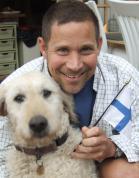 I’m a German ex-pat living in West Wales with my partner, dogs, fish, birds and sheep. An avid reader and fan of the arts, I used to work in museums, libraries and the British Film Institute. Only when my employment with an airline provided me with spare time in transit or hotel rooms did I start writing myself.
I’m a German ex-pat living in West Wales with my partner, dogs, fish, birds and sheep. An avid reader and fan of the arts, I used to work in museums, libraries and the British Film Institute. Only when my employment with an airline provided me with spare time in transit or hotel rooms did I start writing myself.
Did you read much as a child? Are you an avid reader now? Do you prefer books in your own genre or are you happy to explore others?
I always loved reading, from childhood on until this very day. Although my tastes have changed a lot throughout the years, I tend to read the kind of books that I write. I also love comedies but I yet have to try and write one myself.
Are you self-published or traditionally published?
I am self-published. A friend persuaded me to accompany her to a self-publishing course in London where I heard a lot of terrible stories about the degrading experience of looking for an agent. So I decided to go it alone.
Which genre do you write in and why?
 I write historical fiction, contemporary family dramas and thrillers. Books with cultural or educational components, novels set in a different culture or about a specific topic that I know little of are my favourites and those are the type of books I try to write.
I write historical fiction, contemporary family dramas and thrillers. Books with cultural or educational components, novels set in a different culture or about a specific topic that I know little of are my favourites and those are the type of books I try to write.
I’m an impulsive writer and would find it hard to stick to just one genre. My thriller “The Healer” started out as a novel about alternative medicine but then I saw the potential for a thriller and rewrote it.
Who has been the biggest influence on your writing?
Some of my German literature school teachers. Since then it would have to be my editors and beta readers.
Has your country of origin/culture influenced your writing?
Without a doubt. You can take the boy out of Germany but not Germany out of the boy; even after 25 years in the UK. Several reviewers have picked up on it.
What part of the writing process do you find most difficult? How do you overcome it?
To know when to let the story go. A part of me wants to re-write and re-edit every book ‘one last time’ and then another time… I take advice from the beta readers and my editors and remember that in my own critical eye, none of my books will always be ‘perfect’ or ‘finished’.
Do you have a favourite time of day to write?
In the middle of the night or very early in the morning when the world is quiet and I can write without interruptions or feeling guilty for not doing something else that I should be doing.
What is the best thing about being an author? And the flipside – what is the worst?
The best thing is creating an entire new world, where everything is possible. It can be an escapism from the real world or an enrichment of it.
The worst thing is the enormous amount of time that it consumes, and that is just the writing. Let alone the marketing.
Is social media an essential chore or something you enjoy? Which forum do you prefer?
It is a necessary evil and a very mixed blessing. I’m enjoying some parts of it because I get to meet wonderful people whom I otherwise never would have had the privilege to know. On the other hand it takes too much time from other things and the ‘real world’. I have a soft spot for twitter but blogging on wordpress is my favourite platform.
If you weren’t an author, what would you be up to?
I would be a dog walker and dog breeder, a librarian, Reiki healer or run my own B&B, fitness studio or record label.
It’s the last day and the earth is facing oblivion – what book would you read?
”Satan Wants Me” by Robert Irwin
Please tell us about your latest published work.
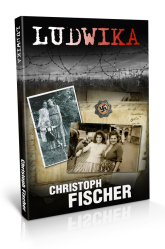 I recently published “Ludwika”, a historical novel about a Polish woman in Germany during World War 2. Ludwika Gierz, a young Polish woman, is forced to leave her family and go to Nazi Germany to work for an SS officer. There, she must walk a tightrope, learning to live as a second-class citizen in a world where one wrong word could spell disaster and every day could be her last. Based on real events, this is a story of hope amid despair, of love amid loss . . . ultimately, it’s one woman’s story of survival.
I recently published “Ludwika”, a historical novel about a Polish woman in Germany during World War 2. Ludwika Gierz, a young Polish woman, is forced to leave her family and go to Nazi Germany to work for an SS officer. There, she must walk a tightrope, learning to live as a second-class citizen in a world where one wrong word could spell disaster and every day could be her last. Based on real events, this is a story of hope amid despair, of love amid loss . . . ultimately, it’s one woman’s story of survival.
Ludwika is available here: http://bookShow.me/1519539118
Christoph has written several other novels which are in the later stages of editing and finalisation.
If you would like to know more about Christoph and his work please see the following links:
Website: http://www.christophfischerbooks.com/
Blog: http://writerchristophfischer.wordpress.com/
Goodreads: https://www.goodreads.com/author/show/6590171.Christoph_Fischer
Amazon: http://ow.ly/BtveY
Twitter: https://twitter.com/CFFBooks
Pinterest: http://www.pinterest.com/christophffisch/
Google +: https://plus.google.com/u/0/106213860775307052243
LinkedIn: https://www.linkedin.com/profile/view?id=241333846
Facebook: http://www.facebook.com/WriterChristophFischer?ref=hl


February 7, 2016
A Conversation with Author Phyllis Goodwin
Today in the Library we have Phyllis Goodwin, who has dropped in to say hello and to share some insights into her life as an author.
You are very welcome, Phyllis, please introduce yourself:
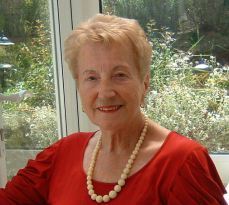 I was born in Bath, United Kingdom and spent my childhood in Argentina. I returned with my parents when I was twelve and attended a Grammar School in Bath. After working in London, I married and moved to the Midlands with my husband. In Southampton, I attended the University as a mature student whilst my two children were growing up. I now have four grandchildren and live on the Isle of Wight. I started by writing articles and a column in a Dog Paper.
I was born in Bath, United Kingdom and spent my childhood in Argentina. I returned with my parents when I was twelve and attended a Grammar School in Bath. After working in London, I married and moved to the Midlands with my husband. In Southampton, I attended the University as a mature student whilst my two children were growing up. I now have four grandchildren and live on the Isle of Wight. I started by writing articles and a column in a Dog Paper.
Did you read much as a child? Are you an avid reader now? Do you prefer books in your own genre or are you happy to explore others?
My parents read to me as a child and I liked telling stories by looking at the pictures. I didn’t go to school until I was seven. I do prefer books in my own genre and belong to a Writing group so I do read a variety of books written by members.
Are you self-published or traditionally published?
My articles have been published in magazines and newspapers. My novel is an historical romance, self-published in paperback, available from Amazon. My non-fiction books are about Field Spaniels.
Has your country of origin/culture influenced your writing?
The country where I grew up has influenced my writing. I like travelling and using impressions in my stories.
Do you have a favourite time of day to write?
My favourite time for writing is in the morning and I have to be strict with myself about going on line to check my emails and social media sites. I try not to do this until after lunch!
What is the best thing about being an author? And the flipside – what is the worst?
The best thing about being an author is holding the finished book in your hand and the worst thing is trying to use all your ideas and put them into print before it is too late.
Is social media an essential chore or something you enjoy? Which forum do you prefer?
I enjoy social media and Twitter is my favourite followed by Facebook and Pinterest.
If you weren’t an author, what would you be up to?
If I were not a writer, I would probably be a pain to my poor children!
It’s the last day and the earth is facing oblivion – what book would you read?
My favourite book is ‘Pride &Prejudice’ by Jane Austen but if the earth is facing oblivion I may try to go to the Moon.
Please tell us what you are working on or your latest published work.
At present I am working on three projects. The first is a book of short stories called: ‘Dog Tales & Other Gems’. This is almost ready for publication when I’ve finished sorting the illustrations. Then my 2nd novel called ‘Home to Haiti’, an historical romance with a touch of mystery and thirdly a Memoir tracing my childhood from three months to 12 years in Argentina. At present this is called ‘It’s Raining Frogs’
If you would like to know more about Phyllis and her work please follow the links below:
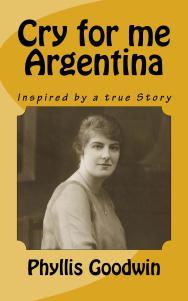 Cry for me Argentina is available on Amazon.co.uk
Cry for me Argentina is available on Amazon.co.uk
Her Field Spaniel books are available to order by Email: goodwinmaydene@aol.com


January 29, 2016
Creating Characters Your Readers Will Love
It’s all very well to have a great story but it’s your characters who are going to tell it for you.
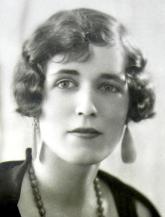 Georgette Heyer – One of my Writing Heroes
Georgette Heyer – One of my Writing HeroesBesides an overdose of historical detail (which can come across as patronising), a common irritant for me as a reader are characters that are so wishy-washy that you want to slap them … very hard. I have a dread of mousey heroines or nice heroes. One of my favourite authors is Georgette Heyer. But I find that the Heyer novels I read over and over are the ones with at least one strong protagonist, and more often than not, two, and they are usually at loggerheads for most of the novel.
Admittedly, when I started writing I didn’t really care much about an audience as I was writing purely for myself, never dreaming that I would someday be confident enough to publish. But once that idea came closer to reality, I did put a lot of thought into character development. It was important for me to come up with detailed back stories, even though after the first draft, most of that material was jettisoned. I think it is important for the reader to get glimpses of these rather than your book getting swamped with them. I like to use tiny snippets of flashback or reminiscing about the past to achieve this.
So then I had to think about what makes a character engaging, which meant analysing what I found interesting in the characters I like in my favourite books. It seemed to me that the characters with personality flaws or quirks were by far the most interesting – the more a character had, the more I could relate to them. Flaws add flesh and bone and make you think – that could be me saying or doing that. Above all, your characters have to be real, and for this genre, they have to be authentic for their time. For the author this means a lot of research and reading a lot of works from that time period. I find listening to music of the period, studying art and old photographs (luckily for me my favourite period is 19th century), helps me to get inside the heads of all of my characters; once you achieve that, it becomes a lot easier to tell their story.
So let me introduce my two protagonists.
Firstly, say hello to Louisa Campbell. She’s no ordinary Victorian miss. In fact, she is the product of a life far removed from what he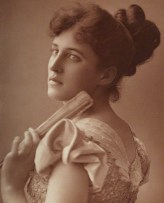 r heritage would suggest. Born to the last heir of an Irish ascendancy family, she never experienced the rights and privileges of her peers. Her father inherited a bankrupt property, gambled the pittance that was left and on his death, left his two daughters struggling to survive, moving from lodging to lodging in the less elegant quarters of 1880s Dublin. Genteel poverty is a knife-edge world and Louisa has to deal with all kinds of individuals most ‘ladies’ of the time would have shrunk from in horror. After encounters with grasping landlords, haggling with pawn-brokers and having to protect herself and her sister, she has become a resilient and self-reliant young woman. Taking care of her sister who is ill, has taught her patience and how to curb her impetuosity (but never fear, it is always bubbling away just beneath the surface). Every penny they have has to be eked out to cover rent, food and doctor’s bills, so she has a firm grasp of the basic economics of living. By the time Louisa inherits her previously unknown uncle’s estate, she is already a strong, independently-minded woman and probably more worldly-wise that most woman of twenty-three at the time.
r heritage would suggest. Born to the last heir of an Irish ascendancy family, she never experienced the rights and privileges of her peers. Her father inherited a bankrupt property, gambled the pittance that was left and on his death, left his two daughters struggling to survive, moving from lodging to lodging in the less elegant quarters of 1880s Dublin. Genteel poverty is a knife-edge world and Louisa has to deal with all kinds of individuals most ‘ladies’ of the time would have shrunk from in horror. After encounters with grasping landlords, haggling with pawn-brokers and having to protect herself and her sister, she has become a resilient and self-reliant young woman. Taking care of her sister who is ill, has taught her patience and how to curb her impetuosity (but never fear, it is always bubbling away just beneath the surface). Every penny they have has to be eked out to cover rent, food and doctor’s bills, so she has a firm grasp of the basic economics of living. By the time Louisa inherits her previously unknown uncle’s estate, she is already a strong, independently-minded woman and probably more worldly-wise that most woman of twenty-three at the time.
Now, say how-do-you-do to Nicholas Maxwel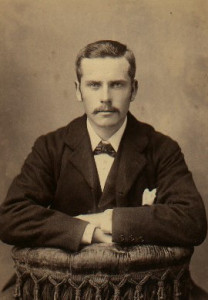 l, Esq. Leader of local society, Justice of the Peace and businessman, he is self-assured and fairly sure he can handle anything life throws at him. However, beneath the confident manner he is hot-tempered, holds grudges and doesn’t suffer fools. Louisa’s late uncle was a thorn in his side and he can almost be forgiven for rejoicing in that man passing through the pearly gates. He is delighted to have an opportunity to buy back the Campbell property which had once formed part of his estate but which his father had lost in a game of poker. He discovers that Campbell’s heir is a penniless Irishwoman and is sure that she will sell up. Nicholas cannot believe it when his approaches to Louisa are rebutted and she moves into Bowes Farm and leaves him in no doubt that she is a worthy advisory. A state of war is declared. Fireworks can only ensue … and they do.
l, Esq. Leader of local society, Justice of the Peace and businessman, he is self-assured and fairly sure he can handle anything life throws at him. However, beneath the confident manner he is hot-tempered, holds grudges and doesn’t suffer fools. Louisa’s late uncle was a thorn in his side and he can almost be forgiven for rejoicing in that man passing through the pearly gates. He is delighted to have an opportunity to buy back the Campbell property which had once formed part of his estate but which his father had lost in a game of poker. He discovers that Campbell’s heir is a penniless Irishwoman and is sure that she will sell up. Nicholas cannot believe it when his approaches to Louisa are rebutted and she moves into Bowes Farm and leaves him in no doubt that she is a worthy advisory. A state of war is declared. Fireworks can only ensue … and they do.
The premise for The Bowes Inheritance was a wrangle over land and a strong woman fighting to keep it. But I have always been fascinated by the strange relationship between the Irish Ascendancy and their British counterparts. The Ascendancy were regarded as the ‘quality’ by the native Irish (though not necessarily loved!) and yet they were seen as second-rate by the gentry in England. I thought this would make an interesting background for my story. So I threw my heroine into a society predisposed to be suspicious of her. Then I added the Fenian bombing campaign that was raging at the time and set it in the beautiful Cumbrian countryside. The result was a battle-royal between two strong-willed and volatile protagonists. Hey presto, my book was born!
The Bowes Inheritance is available on Amazon (ebook or paperback).


January 28, 2016
A Conversation with Author, Sharon Booth
Today in the Library we have Sharon Booth, who has dropped in to say hello and to share some insights into her life as an author.
You are very welcome, Sharon, please introduce yourself:
Thank you very much for inviting me onto your blog. What do you want to kn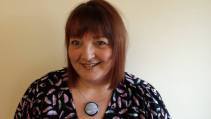 ow about me? Hmm, let’s see. Well, I write contemporary romance—”feel good fiction with heart”—and I’ve had two novels and a pocket novel published, as well as a short story in an anthology called Winter Tales, which was sold in aid of The Teenage Cancer Trust and The Cystic Fibrosis Trust. I live in East Yorkshire, with my very patient husband and our German Shepherd dog. When I’m not writing, I work for the NHS. I love Sherlock, Doctor Who, Poldark and The Musketeers. I eat too much sugar but I rarely drink alcohol. (I’ve been known to get up on the kitchen table and sing Abba songs into a hairbrush when I’ve had a couple of glasses, so best avoided, I think!) I’m one tenth of the Write Romantics.
ow about me? Hmm, let’s see. Well, I write contemporary romance—”feel good fiction with heart”—and I’ve had two novels and a pocket novel published, as well as a short story in an anthology called Winter Tales, which was sold in aid of The Teenage Cancer Trust and The Cystic Fibrosis Trust. I live in East Yorkshire, with my very patient husband and our German Shepherd dog. When I’m not writing, I work for the NHS. I love Sherlock, Doctor Who, Poldark and The Musketeers. I eat too much sugar but I rarely drink alcohol. (I’ve been known to get up on the kitchen table and sing Abba songs into a hairbrush when I’ve had a couple of glasses, so best avoided, I think!) I’m one tenth of the Write Romantics.
Did you read much as a child? Are you an avid reader now? Do you prefer books in your own genre or are you happy to explore others?
I read non-stop as a child. Books fascinated me and I can still remember the first book I ever owned—Noddy by Enid Blyton. She was by far my favourite author in early childhood. Later, I progressed to pony books. I still have a lot of my childhood books even now. When I was about thirteen, I read my first “grown up” books. I discovered Barbara Cartland’s novels first, in the school library, and quite enjoyed them. Then I saw The Dwelling Place by Catherine Cookson on the shelf, and that was that. I was hooked. I read every book of hers I could find. I stuck with that type of book for some years until I was introduced to Jilly Cooper by my mother. She gave me a copy of Polo because she knew I was horse mad and loved pony stories! Little did she realise. That set me off reading a whole new type of book. I don’t read erotica but I do love contemporary romances with a naughty twist and lots of humour. I love reading books in my own genre, but I also love cosy crime, supernatural crime, literary fiction…I’m quite happy to try different genres.
Are you self-published or traditionally published?
Both. I self-published my two full-length novels with Fabrian Books. Initially, Fabrian was a small publishing company with two authors on its books. The plan was they would publish my four Kearton Bay novels and I would receive a percentage of the royalties. Then, after some discussion between us all, it evolved into an author collective. There are five of us now and we are each responsible for getting our own books ready for publication—hiring our own editors and getting our own covers made, for example—but we also help each other out. We may beta read for each other, help with cover design, formatting, or publicity. One of us runs the website and I take care of the Facebook page and Twitter account. We all have different strengths and it’s good to have people to share the journey with. I have also recently had a People’s Friend pocket novel published, and working with DC Thompson was a really easy and stress-free experience. It was lovely to see my book on the shelves in supermarkets and WH Smith. A dream come true. I hope I’ll have another pocket novel published by them one day. I’m working on it!
Which genre do you write in and why?
I write romance—as I said previously, it’s “feel good fiction with heart”. It’s contemporary and full of humour, but with a strong romantic story at the centre of it. I write the books I like to read the most, I suppose. If I fall in love with my hero, want to be friends with my heroine, have a few laughs and occasionally get a bit emotional as I’m writing, I know I’m on the right track.
Who has been the biggest influence on your writing?
I suppose every author whose work I’ve ever read has played some part. It’s hard to say, because I think, as readers, we absorb so much from the books we read, and I’ve read a lot! If I was going to choose one person, I’d say Enid Blyton. Not because I write like her, but because she inspired me to want to pick up a pen and write my own stories, create my own characters, go on my own fictional adventures. I’ll always be grateful to her for that.
Has your country of origin/culture influenced your writing?
I think it probably has. I love the British countryside and tend to set my stories within its landscape. I think the British have a certain type of humour, too, and I love that. I suppose my heroes are distinctly British, although I hadn’t thought about it until now. They’re not exactly hot Latin lovers. They’re rather stoic and not given to dramatic declarations of love. Deep within them, though, is a core of passion that only the heroines can awaken. And, again, they have that humour. Interesting question! I honestly hadn’t considered the matter before, but now I can see the link.
What part of the writing process do you find most difficult? How do you overcome it?
The first draft is a real chore. Forcing myself to sit at my desk and put words on the screen is so hard. When you first start a novel and it’s all very new and exciting, it’s not so bad, but as it goes on and you reach that horrible point when you just think everything you’re writing is rubbish and you can’t imagine why you’re bothering, then it becomes a real endurance test. The only way to overcome it is to get on with it. I make myself write and try to stay at my desk until I’ve written at least one whole scene. If I didn’t it would never get finished, so there’s no choice.
Do you have a favourite time of day to write?
I write in the mornings because I’m at work every afternoon, and I’m too tired to write at night. The mornings are my best time, by far. I get up, make myself a cup of tea, and head into my office to get that scene written before I do anything else.
What is the best thing about being an author? And the flipside – what is the worst?
The best thing about being an author is, without a doubt, getting feedback from people who’ve read and enjoyed my work. I’ve had some lovely reviews, which I’m so grateful for. People I know have been so enthusiastic, but it’s a special thrill when I get a message on Facebook or Twitter from someone I don’t know at all, telling me they’ve read one of my books and loved it. That’s just amazing and makes it all worthwhile. The worst thing is having no time to spend with family and friends. Social life goes out of the window, really. When you’re trying to write a book and you also have a job to do it’s hard to juggle everything. I feel permanently guilty that I don’t spend enough time with my husband and family. It’s hard to get the balance right.
Is social media an essential chore or something you enjoy? Which forum do you prefer?
I enjoy Facebook. I love chatting to people on there, posting pictures, sharing other people’s photos and news. I also have an author page, because I think it’s expected now that writers do have these separate “professional” pages. Twitter is a bit trickier. I find it hard to keep up with what’s going on there, and it’s not as easy to follow as Facebook. I am trying to learn more about it because I know it’s important, but I feel more comfortable with Facebook. I have Pinterest boards and a blog, and I’m hoping to get to grips with Instagram soon, but it is all very time-consuming. If I wasn’t writing, I wouldn’t bother with any of them except Facebook, but maybe if I understood them more I would enjoy them more. That’s why I’m making it my mission to learn, but I don’t want to give up even more of my precious time. That’s the dilemma.
If you weren’t an author, what would you be up to?
Still doing my day job, working in a health centre, probably—and being a much better wife, mother and grandmother. Maybe I’d even bake, as I used to when my children were little. No, who am I kidding? I’d probably just read more.
It’s the last day and the earth is facing oblivion – what book would you read?
Oh, gosh! Really? How on earth do you decide that? A literary classic like To Kill a Mockingbird or Jane Eyre? Probably wouldn’t have time. A great love story? I don’t think it would distract me from my fate. A crime or thriller? I’d be gloomy enough already. I would probably go for an Adrian Mole book by Sue Townsend. They’re absorbing and easy to read, hilariously funny, yet terribly poignant at the same time. I think if Adrian Mole was my last thought, I could face oblivion with a smile.
Please tell us what you are working on or your latest published work.
A Kiss from a Rose is the second in my Kearton Bay series. It’s set in the same fictional village on the North Yorkshire coast as my first book, There Must Be An Angel, and features some of the same characters. However, it can be read as a standalone.
Here’s the blurb:
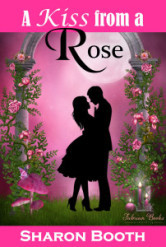 In spite of managing to get a black eye at her best friend’s wedding, Rose MacLean knows she’s never had it so good. As a partner in a thriving business, her financial problems are easing, and her eldest daughter has finally found employment, while her youngest is doing well at school.
In spite of managing to get a black eye at her best friend’s wedding, Rose MacLean knows she’s never had it so good. As a partner in a thriving business, her financial problems are easing, and her eldest daughter has finally found employment, while her youngest is doing well at school.
But Rose’s life never seems to run smoothly for long, and, sure enough, her eldest daughter has soon walked out of her job, while her youngest appears to have had a personality transplant. To make matters worse, her mother is back on the scene, and she seems to be reliving her misspent youth with her oily-haired, horse-faced ex, Alec Thoroughgood.
With her best friend preoccupied with the arduous task of baby-making, Rose finds herself relying more and more on the quiet Flynn Pennington-Rhys, who seems to be everyone’s hero. But Flynn has his own problems, and as events take an unexpected turn, Rose realises that she may not always be able to rely on him.
Will the quiet man come through for her? Will her daughters ever sort themselves out? And will Rose ever get her bedroom back from her mother, or is she destined for a life on the sofa?
A Kiss from a Rose was published by Fabrian Books in September 2015. Amazon.co.uk
If you would like to know more about Sharon and her work please click on the links below:


January 22, 2016
A Conversation with Author, Mary Grand
Today in the Library we have Mary Grand, who has dropped in to say hello and to share some insights into her life as an author.
You are very welcome, Mary, please introduce yourself:
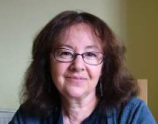 I was born in Cardiff and have retained a deep love for my Welsh roots. I worked as a nursery teacher in London and later taught Deaf children in Croydon and Hastings. I now live on the beautiful Isle of Wight with my husband, where I walk my cocker spaniel, Pepper, and write. I have two grown up children. ‘Free to Be Tegan’ is my debut novel. It is to be the first of a series of novels set in Wales. The second will be set on the spectacular Gower Peninsula.
I was born in Cardiff and have retained a deep love for my Welsh roots. I worked as a nursery teacher in London and later taught Deaf children in Croydon and Hastings. I now live on the beautiful Isle of Wight with my husband, where I walk my cocker spaniel, Pepper, and write. I have two grown up children. ‘Free to Be Tegan’ is my debut novel. It is to be the first of a series of novels set in Wales. The second will be set on the spectacular Gower Peninsula.
Did you read much as a child? Are you an avid reader now? Do you prefer books in your own genre or are you happy to explore others?
As a child I loved Enid Blyton.
Now I read each day and enjoy a wide variety of books. Recently I have read The Return by Victoria Hislop, Rebecca by Daphne du Maurier, Body on the Beach by Simon Brett, and Recipe for Life, the autobiography of Mary Berry.
Are you self-published or traditionally published?
I am self – published.
Which genre do you write in and why?
I write Woman’s Fiction. My central characters tend to be women at a crisis point of their lives.
Who has been the biggest influence on your writing?
Joanna Trollope and Jane Austen are both authors I admire and both have inspired me to want to write accessible and interesting stories.
Has your country of origin/culture influenced your writing?
Although I live on the Isle of Wight, my roots are in Wales. My debut novel Free to Be Tegan is set in the wild Cambrian Mountains, and the novel I am writing at the moment is set on the stunning Gower peninsula.
What part of the writing process do you find most difficult? How do you overcome it?
I think one of the hardest things for me is to actually shut myself off from all the other things I could be doing. I have found having a routine has really helped. Now I walk the dog first thing and then aim to turn off my internet and settle to writing. Working from home can be challenging and I know some writers go out to cafes and libraries. However, for me, it has huge benefits, including warmth, comfort and free coffee.
Do you have a favourite time of day to write?
I think the morning is a good time for me. However I also get inspiration in the middle of the night and now keep a pad and pen next to the bed.
What is the best thing about being an author? And the flipside – what is the worst?
One of the things I love about being an author is creating a whole world of characters and a life for them. I also enjoy researching the places I set my stories in.
One of the hardest things for me is when I hit a wall. I find the best remedy is to go out with the dog up on the downs or on to the beach or alternatively go for coffee and cake with a friend. (Cake always helps!)
Is social media an essential chore or something you enjoy? Which forum do you prefer?
I really enjoy Facebook. I have made lovely friends in various groups who have been incredibly supportive and encouraging.
If you weren’t an author, what would you be up to?
If I wasn’t an author I think I would like to work with an animal charity or a bookshop.
It’s the last day and the earth is facing oblivion – what book would you read?
I think I would need to escape somewhere beautiful, maybe I would read The Shell Seekers by Rosamunde Pilcher.
Would you like to tell us what you are working on or your latest published work.
Free to Be Tegan
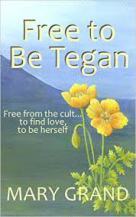 Tegan was brought up in a psychologically abusive cult. This is the uplifting story of her journey to find herself and flourish in a world she has been taught to fear and abhor.
Tegan was brought up in a psychologically abusive cult. This is the uplifting story of her journey to find herself and flourish in a world she has been taught to fear and abhor.
Guilt and shadows from her past haunt her in flashbacks, panic attacks and a fear of the dark. However, she also finds a world full of colour, love and happiness she has never known before.
The story opens as Tegan, aged twenty seven, is cast out of the cult, rejected by her family and the only life she has known. She is vulnerable and naïve but she also has courage and the will to survive. She travels to Wales, to previously unknown relations in the wild Cambrian Mountains.
The wild beauty of the hills, the people she meets and the secrets slowly revealed by the cottage all provide an intriguing backdrop to Tegan’s drama.
The novel is set in spring. Although it grapples with difficult issues it is far more than a mere tale of survival. It is one of hope, new growth, of the discovery of self and the joy of living.
If you would like to know more about Mary and her work please click on the attached links:
Buy ‘Free to be Tegan’ on Amazon
Mary’s Author Page on Goodreads


January 21, 2016
How to Market your Self-Published Book
I’m joking; if I knew I’d be a millionaire. If anyone tells you they have the magic formula – back away very slowly. I do believe that there is one little pie ce of magic involved, but I’m not going to reveal what it is until the very end.
ce of magic involved, but I’m not going to reveal what it is until the very end.
This world of promotion and marketing is all very new to me. This time last year I wasn’t even sure I was going to publish. However, encouraged by my wonderful editor, Hiliary Johnson and friends and family, I finally took the plunge last July and set my book baby free in the big bad world. Frankly, that was the easy bit; what came next is like something out of a nightmare. There I was clutching my book baby and no clue how to get it noticed. I ran around like a headless chicken trying this method and that. Some succeeded and others failed. What follows is a ‘History of the Trials and Tribulations of an Indie Author in the Virtual World’!
A slight tangent first. Here is a checklist. If you cannot tick off all of these then don’t read any further.
I have written the best possible book/short-story/script/play, etc., that I possibly can.
I have had my work professionally edited and proofread at least once (best friends, grannies, etc., do not count!)
I have the best possible book cover, that has been well researched (i.e., appropriate to my genre).
I have a blurb that will have potential readers salivating.
I realise that the hard work is only beginning! [No groaning please]
All of that in order? OK, let’s proceed. Just to be clear, my book is my debut and entirely self-published in July 2015. It is available as a Print on Demand paperback (POD) and ebook, is historical fiction, and so far only on Amazon. I can’t comment on any other platforms as I have not used them yet. I am not going to endorse any particular method but I will tell you what has worked for me.
Pre-Launch:
I probably fell down here at the very first hurdle. I didn’t have a coherent plan or budget, at all. I did read up on it but was so stressed about getting the book up on Ama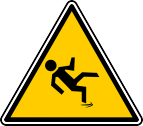 zon on time that I let all of that stuff drift. I didn’t have a strong social media presence either. I only set up my website/blog a few weeks before launch. I joined Twitter a bit late as well and had no clue how to use it well. I did announce my book on my personal Facebook page and I got an overwhelming response from my friends and family (this probably accounted for most of my sales in the first 3 months). I set up a page on FB for the book but then found myself duplicating posts and probably annoying the hell out of people. I have since created a new author page as opposed to a book specific page, ‘cos I plan on writing more books!!
zon on time that I let all of that stuff drift. I didn’t have a strong social media presence either. I only set up my website/blog a few weeks before launch. I joined Twitter a bit late as well and had no clue how to use it well. I did announce my book on my personal Facebook page and I got an overwhelming response from my friends and family (this probably accounted for most of my sales in the first 3 months). I set up a page on FB for the book but then found myself duplicating posts and probably annoying the hell out of people. I have since created a new author page as opposed to a book specific page, ‘cos I plan on writing more books!!
So what should I have done or done better?
Pre-launch promotion will build up interest in your book. Set up your author website/blog as soon as possible. I use WordPress – it’s free and it’s easy to use. I did purchase my domain name so that I could use www.pamlecky.com – it looks more professional than a long and hard to remember URL.
If you are launching an ebook on Amazon, you will have the choice of loading it up for pre-order. Do it – I did get a reasonable number of pre-orders, but I didn’t promote it enough!
Obviously, build up some anticipation on Twitter and Facebook and if you don’t have an author page, create one. I try to keep my personal stuff and publishing stuff separate. Invite your friends to ‘like’ your author page that way they have a choice. I now keep my promotional stuff almost exclusively on my author page.
Sit down and decide on a marketing budget.
I made a book trailer with the help of my daughter and promoted it before launch. It is a nice to have, and we had a lot of fun putting it together, but I honestly don’t know if it generates sales. I suspect if you are an established author it might. I was able to make mine very cheaply as my daughter is a bit of a whizz on the tech stuff and had previously made a book trailer as part of a school project (her writing was published before mine, by the way!). The main cost was the purchase of iStock images (between $1-3 each), some video and I also bought a backing track (all very reasonable if you look around). Word of warning – don’t infringe anyone’s copyright. Purchase the licences or don’t do this at all.
I had business cards printed. Cost me about €20 euro for 200.
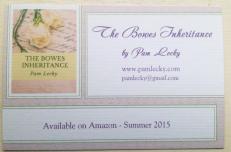 You can give these to people or ask to leave a few in shops, pin to notice boards wherever you can. Ninja dress-code and stealth advised! The title of my book was long and I was using my maiden name, so the cards were a very handy way of making sure that people searched for the right book when they went online. These definitely generated some sales.
You can give these to people or ask to leave a few in shops, pin to notice boards wherever you can. Ninja dress-code and stealth advised! The title of my book was long and I was using my maiden name, so the cards were a very handy way of making sure that people searched for the right book when they went online. These definitely generated some sales.Things I didn’t do but might be worth looking into:
Amazon and Goodreads ads pre-launch.
Send a copy of your book to reviewers well before launch – great pre-launch reviews would be worth their weight in gold and if you are going the POD and ebook route, you could add them into the book cover/inside blurbs, etc. before launch.
Book launch: I didn’t have the funds and the advice out there was not to bother if you are self-publishing and going the POD route in particular. The cost would have been high for me as I would have had to buy the books from Amazon and pay the huge whack of postage they charge from the US (I think it is different if you are resident in the UK as CreateSpace print there). ALSO, the sales would not be recorded as sales, only as purchases by me. (Sales count if you are going out looking for an agent/publisher at a later date). I was told by an industry professional (and open to correction on this) that the definition of a successful book is 2,000 sales in 2 years. Again, this could be for a traditionally published as opposed to self-published book.
Post Book Launch:
These are in no particular order:
Radio Interview: I was lucky that a friend of mine had a contact with a local radio show that did author interviews. Slightly terrifying to do but actually was OK once you got into it. Did it generate any sales? I really don’t think it did but I have a link to it on my website (looks good if potential agent/published has a peek) and it was great experience for when I go global!!!
Goodreads Giveaway: You must set yourself up as an author and put up your book det
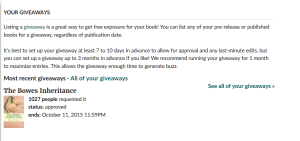 ails (you will have to have an ISBN). Definitely the most useful promotion I have done. I put up six copies of my book (signed) and ran it for one month. Over 1,000 people entered. I also run a Goodreads Ad for the book that is ticking away in the background. You set your own budget for these, and pay per click. I also found Goodreads support staff very good to deal with as the advertising pages are a little tricky. Over 500 people have added my book to their ‘on the shelf to read’ list – hopefully potential sales. Goodreads is great in that readers can post reviews and ratings, follow you, follow your blog, etc. Just be aware that Goodreads is owned by Amazon.
ails (you will have to have an ISBN). Definitely the most useful promotion I have done. I put up six copies of my book (signed) and ran it for one month. Over 1,000 people entered. I also run a Goodreads Ad for the book that is ticking away in the background. You set your own budget for these, and pay per click. I also found Goodreads support staff very good to deal with as the advertising pages are a little tricky. Over 500 people have added my book to their ‘on the shelf to read’ list – hopefully potential sales. Goodreads is great in that readers can post reviews and ratings, follow you, follow your blog, etc. Just be aware that Goodreads is owned by Amazon.Kindle Select: I resisted joining this initially and have to say it works very well. I have now run two countdown deals (ebooks at 99p/99c for a week) and sold about 140 books this way. Your book also goes into Kindle Unlimited where subscribers read your book for free. Amazon pays you a small amount for each page read, out of a global fund. People have read the equivalent of 40 copies of my book and although the income is small it is still getting my book out into reader’s hands. Hopefully if they like it they will remember me and buy the next book.
I begged for Reviews on Amazon & Goodreads: OK, you are unknown, first book and you desperately need those reviews so swallow your pride and ask – blanket requests for reviews don’t work. Email/text/message people one to one – they will usually respond. It keeps the ball rolling for you. The more reviews that are up the more notice people will take of your book if they come across it in a random search. It also affects how Amazon ranks your book.
Book Promotion Company: Boy, did I fall for this one. I won’t name the company and I don’t think it really matters which one you use. They will promise you the world. It didn’t work for me. They tweeted (only) about my book a couple of times a day for a week. It cost be $60. I deliberately didn’t do any other promotion that week to see if it worked. It didn’t produce 1 sale. The only good thing from it was that it generated about 70 twitter followers. Two people visited my website that week and they probably weren’t as a result of the promotion. Approach these with extreme caution. I certainly won’t use one again.
FACEBOOK: I love FB and find it much easier to use than Twitter. Finding writer groups, etc., is a great idea. Not only did I find my editor but I have found groups of authors who specialise in my genre. Most are indie like me and very supportive. As an aside, I have also found some great blogs hosted by these authors that really help with either writing or research. Well worth finding these and contributing – good things will come of it. Best of all was finding FB Twitter Groups. I have found these invaluable for promotion. They are closed groups (sometimes genre specific) that agree to retweet each other’s posts. You agree to 100% reciprocation. I am in a few different ones but there is an Indie specific one. PM me for details.
Facebook ads: I have run two of these. Gained me a lot of likes but did not boost sales. I have now set up a ‘Buy Now’ button on my author page – it’s getting some clicks and may generate some sales. It’s free, so why not do it.
Facebook Promotion of your posts: I only recently discovered that the posts you put up on your author page only reach a certain percentage – that is why you will see ‘do you want to boost this post’ messages. I thought that everyone who liked a page saw the posts – not the case, my friends. I was more than a bit miffed when I discovered this – on average only about 150-200 out of 3,000+ people actually see what I post on my author page.
Book Competitions: The world isn’t fair, you already know that. Most of the big competitions won’t accept Indie authors. That’s just the way it is. However, there are competitions out there that do. Research and find them. If your book wins an award I imagine it is a huge boost to your promotional opportunities. My book was long-listed for an award and I use that extensively in promotions, added it to the Amazon and Goodreads’ description of the book. It will also go into the promotion for the next book – you see how it works?
Book Reviewers: I have sent my book to reviewers that I have found through FB/Twitter or blogs. I have never paid for a review and never intend to. Don’t risk it – Amazon will find out and withdraw the review and Lord knows what else. Anyway, isn’t it dodgy? Would you really be happy with a fake review? Lots of reviewers have blogs and the more prestigious the reviewer the better the exposure for you and your work. Be mindful; the Amazon top 100 reviewers are virtually impossible to engage.
Writing Websites: I had a link to an Irish writing website as the owner also ran the company which did my first structural edit. Through some emailing, I have managed to get two articles published online and they are currently reviewing my book. Well worth a look on the internet to see if there are any you can contact. Again, probably not massive exposure but it all helps.
National Media: Forgive me while I fall around laughing. In Ireland you have virtually no chance of national coverage unless you are in the know. End of and I don’t intend wasting any more time or money trying to get the national broadcaster or newspapers to review my book (several copies of my poor book lie forlorn in their storage areas or waste bins). If my book ever wins an award, I will have one more go at this, but I won’t lose sleep over it in the meantime.
Local Press: the local papers are much more amenable to supporting you. I was able to have a large piece put in a Dublin-wide paper. Not sure if it generated any sales but didn’t do any harm and a few people mentioned that they had seen it.
TWITTER: Grrrrrrh. Can’t make up my mind about it. I find it clunky. Most of my followers are authors or book promoters and guess what they are doing? Yeah, promoting. I could have a rant about automatic DMs but you might be eating your breakfast. Don’t you hate when you follow someone famous and all they do is tweet constantly about their book and never interact. You just know someone is doing it for them. I don’t believe that is what Twitter is about. Interact with me like a normal human being and I will start a conversation – it might go somewhere, we might become friends or not. I am more inclined to look into the work of someone who has the courtesy to ‘talk’ to me (and that goes for FB as well). I’ll leave it there – I think you know what I’m saying. It has its place but don’t become obsessed with it. Social media can suck the life and the hours from you.
Blogging: Write about the things you love. Write well and you will pull people to your site. Keep it interesting by doing a mix of stuff. I don’t use the blog to directly promote (bar the actual book launch and perhaps some big book news) but the information is there for any visitor to see. Make sure that people can sign-up to follow your blog, can contact you easily (I actually set up a separate gmail account for this as I didn’t want to give out my personal email). Most importantly, set up a Newsletter sign-up. Capture those emails so that when it comes to the next book launch you can dazzle with your amazing cover/blurb and exclusive content.
BookBub: is supposed to be good for promoting a book deal but notoriously difficult to be accepted. Haven’t tried it yet.
So, you have to ask yourself – what am I trying to achieve? It isn’t just about sales. It is about establishing yourself as a professional writer. Instant success and massive earnings only come to a few. You are building up your profile over time. Write well and the reviews will come. People will notice and recommend your work and this in turn will generate those precious sales.
So what is that little piece of magic I mentioned at the start? Haven’t you guessed?
Your writing, plain and simple!

